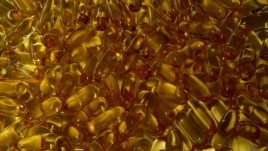VOA: July 12, 2013
Fish oil supplements that are high in omega-3 fatty acids have been quite popular among people who take them to help with issues such as heart health.
Past research has indicated that omega-3 fatty acids, which are found in fish, fish oil and other foods such as wild rice and walnuts, can decrease the likelihood of cardiovascular disease.
But now new research released this week indicates that too much omega-3 could put men at a higher risk of developing prostate cancer, especially a deadly form of the disease. The finding confirms similar conclusions made in several earlier studies.
While some experts have expressed skepticism about the study’s findings, men taking the supplement may find themselves weighing the benefits fish oil capsules may provide for their heart health versus the possible harm and increased risk of developing prostate cancer.
The study, conducted by researchers at Seattle’s Fred Hutchinson Cancer Research Center, found that high concentrations of three anti-inflammatory and metabolically related fatty acids called eicosapentaenoic acid - EPA, eocosapentaenoic acid - DPA and docosahexaenoic acid – DHA that are found in fatty fish such as salmon as well as in fish-oil supplements, are linked with a 71 percent increased risk of developing high-grade prostate cancer, the kind that experts say are more likely to be fatal.
The Seattle study also revealed that too much of the fatty acids can also lead to a 44 percent increase in the risk of low-grade prostate cancer – which grows slowly - as well as an overall 43 percent increase in risk for all forms of prostate cancers.
 Fish oil capsules are popular for heart health benefits
Fish oil capsules are popular for heart health benefits
To reach their findings, the researchers studied a group of about 843 men who had prostate cancer and another group of 1,383 men who didn’t have the cancer. They found that the prostate cancer patients had higher levels of the omega-3 fatty acids in their blood than those in the non-cancer group.
The researchers said that the consistency of their findings suggest that these fatty acids are connected with the development of prostate tumors. They also caution those who want to increase their dosage of omega-3 fatty acids to consider any potential risks.
The researchers said they’re unclear so far about why the high levels of omega-3 fatty acids would increase prostate cancer risk. They do point out that omega-3 fatty acids converting into compounds could damage cells and DNA, and their role in immunosuppression. They said that they don’t know whether or not these effects can actually impact cancer risks and that further research into possible mechanisms will be needed.
These new findings, published July 11 in the online edition of the Journal of the National Cancer Institute, confirm those made in 2011 by the same Seattle researchers.
